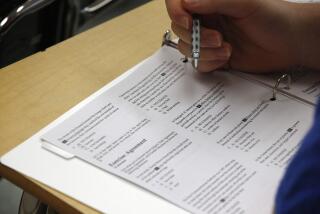Low test scores, high achievement?
In The Times’ story on his documentary film “Two Million Minutes,” Bob Compton rightly points out a problem with our children’s level of knowledge, but his diagnosis of what is wrong with America’s schools does not follow.
Compton’s quotes from Chinese and Indian students reveal kids who are dedicated to and interested in learning. They are motivated to study. His quotes from American students expose kids who are not. These attitudes and motivations are learned from parents, not schools. Our schools have to make do with what parents send them. The fix begins at home.
Both Compton and the Harvard academics he debated were wrong on the question of whether we can learn something from other nations. The academics were wrong in saying we cannot. Compton is wrong in assuming that those nations are a good model for our schools. The best model is America’s educational system from 40 to 50 years ago, which shaped the generation that took the first worldwide test of school-age children. On that test, in 1964, America’s students finished in second-to-last place. If the theory that low test scores harm a nation economically is true, then the American economy today would be well behind those of higher-scoring nations.
But the generation tested in 1964 has been running the world for the last couple of decades, and America’s performance is far ahead. According to my research, every year our economy creates over $44,000 more wealth per every family of four than do higher-scoring nations. Those nations averaged economic growth of 2.5% from 1992 to 2002, soundly beaten by America’s 3.3%. Our low-scoring students produce 63% of the world most-cited scientific articles and 38% of the Organization for Economic Cooperation and Development’s patents for new technologies. The number of U.S. patents is growing 6.6% annually, compared with 5.1% for the European Union and 4.1% for Japan.
This is not the work of a failed school system. This is the work of the best school system the world has ever seen -- the American public schools of the 1960s -- and those schools (and the parents of that time) should be our model, not China or India.
In fact, China is trying to solve the American mystery -- why do our schools seem to work despite low test scores? If China’s leaders solve the puzzle, do you think they will tell us, or will they let us continue down the blind alley of raising test scores? Our political leadership is worried about China’s rising power in the world while pursuing educational policies that China is trying to escape.
It is long past time to stop blaming our schools for the mistakes America’s parents make. Our schools do something right, which drives our economic success but which is not detected by test scores. We don’t know what that something is because we have been looking solely at the wrong things -- how to raise test scores and overcome bad parenting.
Keith Baker is an educational researcher retired from the U.S. Department of Education.
Blowback is an online forum for full-length responses to our articles, editorials and Op-Ed articles. Click here to read more about Blowback, or submit your own by e-mailing us at opinionla@latimes.com.
More to Read
A cure for the common opinion
Get thought-provoking perspectives with our weekly newsletter.
You may occasionally receive promotional content from the Los Angeles Times.





